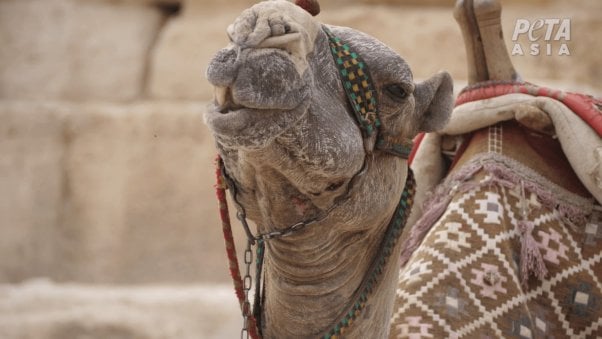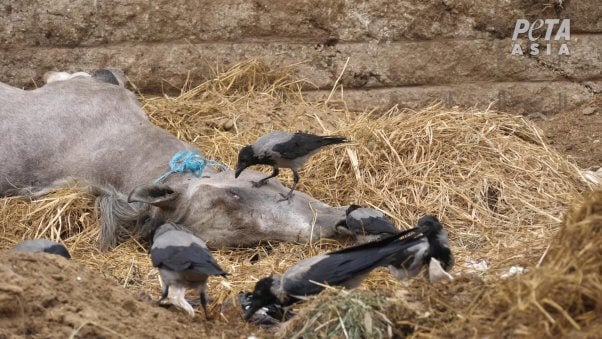Victory! Airbnb and Other Travel Companies Cut Ties With Animal Rides in Giza
Victory! After meeting with PETA, Airbnb stopped selling tours and other experiences with camel and horse rides at the Giza pyramid complex. This decision comes after PETA Asia’s investigators blew the lid off of cruelty and abuse in Egypt’s tourism industry, in which workers beat exhausted horses forced to haul tourists in carriages and use camels as photo props. These animals are exploited in the blistering heat without adequate access to food, rest, shade, or veterinary care.

Airbnb is joined by several other travel companies—including Black Tomato, Shore Excursions Group, ToursByLocals, Under30Experiences, World Travel Holdings, and others—which have also discontinued animal rides at the site.
Why Airbnb and Other Compassionate Companies Are Taking Action
Multiple PETA Asia investigations have revealed that at Egypt’s top tourist sites, workers routinely whip horses while making them tow tourists in the blazing sun. Handlers deny animals adequate rest and violently strike them when they struggle to keep going. The animals are constantly hungry and tired and are denied veterinary care for wounds and injuries. Investigators saw injured and malnourished horses eating from garbage dumps and found the bodies of dead horses discarded at trash sites outside the pyramids of Giza.

When camels can no longer be exploited for rides or used as photo props, they’re often sold to slaughterhouses to be killed for their flesh. PETA Asia’s footage showed workers slashing camels’ throats in plain view of other animals—likely causing panic to these highly social and sensitive herd animals—and sometimes even in front of children. One camel continued to kick for four agonizing minutes after a worker slashed their throat.
The only way to ensure camels and horses don’t suffer is to stop exploiting them altogether. The growing list of companies that refuse to support the egregious cruelty in Egypt’s tourism industry marks a hopeful shift towards compassionate, animal-free attractions. Innovations such as electric carts, cable cars, ATV bike rides, and others can provide tourism businesses with a source of income that doesn’t involve animal suffering.
Camels and Horses Don’t ‘Belong Anywhere’ Near Abusive Tourist Sites
Camels and horses are emotional, family-oriented animals who form long-term friendships, protect their herd members, and nurture their young. Camels are known to “blow” on each other’s faces as a friendly greeting, and mother horses sing lullabies to their precious babies. These animals have unique personalities and can experience love, pain, and fear. They do not want to be worked nearly to death or used as photo props.
YOU can take action by never participating in tourism involving animals—including camel and horse-drawn carriage rides. Please urge Egyptian officials to impose a ban on using horses and camels to entertain and transport visitors at the pyramids and other tourist sites:

